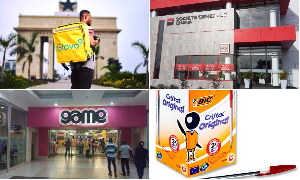Regional News of Saturday, 4 October 2014
Source: The Chronicle
1st Phase of street naming project successful - MCEs
The Berekum Municipal Assembly in the Brong-Ahafo Region has proven to be obedient in meeting the September 2014 ultimatum issued by President John Dramani Mahama for Metropolitan, Municipal and District Chief Executives (MMDCEs) to complete the street naming and house numbering exercise in their jurisdiction.
During his state of the nation address, President Mahama directed all Metropolitan, Municipal and District Assemblies to name all streets in their jurisdiction to ensure easy movement and collection of revenue.
So far, the first phase of the pilot project, which involves mapping, capturing of streets and buildings have been completed. Data collected are currently being analysed by the assemblies, which would guide them to map out strategy to increase revenue generation.
Speaking to the Municipal Chief Executive of Berekum, Mr. Opoku Boakye Yiadom, via phone yesterday, he disclosed that the Street Address Team went through a series of consultation with stakeholders to obtain the names of streets which were approved by the Municipal Statutory Planning Committee, following the procurement of the sign post for the exercise and that all is set to erect the poles with the plates.
Mr. Opoku Boakye Yiadom continued that by Monday, October 6, 2014, the people of Berekum will witness the first 28 streets that have been named upon the agreement of the various stakeholders and with the approval of the Municipal Statutory Planning Committee.
The Berekum MCE, who was in Accra during the telephone interview, hinted that he was currently pursuing the contractor hired to produce the plates embossed with the names of the respective streets for delivery, and hopefully the plates would be in Berekum on Friday, October 3, 2014.
He said though 28 streets would first be named, there were over 70 plates to be erected due to the linkages of some of the streets.
According to Mr. Opoku Boakye Yiadom, the consultations were smooth and peaceful without any objection to the suggested names given the streets.
However, issues were raised concerning some of the streets which were named after some chiefs and their titles, but they were amicably resolved.
According to him, some of the chiefs protested against the use of the tile “Amokona Diawuo ” for a particular chief, because it is a title used for chiefs in the Berekum traditional area.
The MCE said the exercise would help the Assembly to produce an infrastructural development map, increase revenue generation of the Assembly due to the digitization that would be done to fish out property owners who were engaged in property tax fraud.
“The exercise is not just putting in place signage for directions but the collection and management of data as well for property planning and rapid development”, he said.
Mr. Opoku Boakye Yiadom thanked the Traditional Authorities, Assembly members, Street Address Team, the youth and other stakeholders for their contribution to the success of the exercise.
BAWKU
From Bawku, William N-lanjerborr Jalulah also reports that, in spite of its security challenges as a result of the protracted chieftaincy conflict, the Bawku Municipal Assembly is successfully carrying out its Street Naming and Property Address Exercise.
The Municipal Chief Executive, Mr. Bukari Issaku, told this reporter that before the September 30 deadline given by President John Mahama, his assembly had named a total of 27 major streets and roads within the township. Out of the number, 10 had been provided with signage, thus scoring his assembly a success mark of 45% to 50%.
He said though there were some challenges in coming out with the names, the assembly used what he described as a participatory approach to reach consensus with the stakeholders, such as with opinion and traditional leaders, assembly members and engineers.
One major challenge he identified was how to agree on common names, as different parties wanted their favourite names to be used, but at the end of their deliberations, they all adopted some names for various streets and roads.
The streets have been named after persons dead or alive who have contributed to the development of the Municipality. Some roads have also been named according to the towns or places they lead to.
The next stage of the exercise was property naming and Mr. Issaku said that was also posing some challenges due to the heavily populated nature of the town. He was, however, hopeful the assembly could overcome that as well.
HO
From Ho, correspondent Samuel Agbewode reports that The Ho Municipal Chief Executive, Mrs. Fafa Adinyirah has expressed satisfaction about the street and property naming exercise in the Municipality. According to her, about 2000 streets and properties have been identified for the exercise.
Mrs. Adinyirah explained that the exercise was highly technical and very expensive but the Municipal Town Planning Officer, Mr. Felix Seloame, was highly on top of his job, which made the exercise very smooth and very successful in the Municipality.
Speaking in an exclusive interview with The Chronicle in Ho, the MCE continued that the street and property naming exercise should not be considered as just one event, but as a complete process and that the Ho Municipal Assembly would spend GH¢ 1.4 million and that one sign-post cost GH¢ 700.
Mrs. Adinyirah continued that the exercise in the area had reached what she described as the trial end, because the sign-posts have been developed and would be erected at the identified streets.
According to her finance was the major constraint and that the Capacity Support Fund released to the Assemblies had already been spent on the project.
She further explained that the exercise would be carried out in phases of which phase one has now been completed.
Mrs. Adinyirah said when completed the Assembly would improve upon its revenue collection because it would be easy to identify streets and collect property rates.
She pointed out that the Ho Municipal Assembly under the Ghana Urban Management Pilot Project had a provision that could help get funds to finance the exercise and disclosed that the German Support Cooperation would assist the Assembly in further data collection exercise and pay the data collectors to ensure that every part of the Municipality was covered.
The Ho Municipal Town Planning Officer, Mr. Felix Seloame, on his part told The Chronicle that the street and property naming exercise was highly technical saying his outfit lacked the necessary personnel to carry out the exercise quickly.
He disclosed that the Municipality was supposed to have three Town Planning Officers but they only have one thus putting undue pressure on him.
Mr. Seloame pointed out that stakeholders meeting have been held and participants were actively involved to ensure that the people agree to the names that would be used for the street naming exercise.
In a related development, the Keta Municipal Chief Executive, Mr. Sylvester Tornyeava has also told The Chronicle that the Assembly had completed the naming of 57 streets in three towns. Mr. Tornyeava mentioned Tegbi, Anloga and Keta communities as the towns where the exercise was successfully carried.
According to him, GH¢ 60, 000 Capacity Building Fund had so far been spent on data collection, which included the purchase of equipment.
He stressed that part of the Common Fund was being used and that by the end of 2015, all the streets and properties would have been named to enhance revenue collection in the Municipality.
He noted that towns and villages such as Abor, Atiave, Wuti, Srogbi and Anyanue among others, would all be covered.










